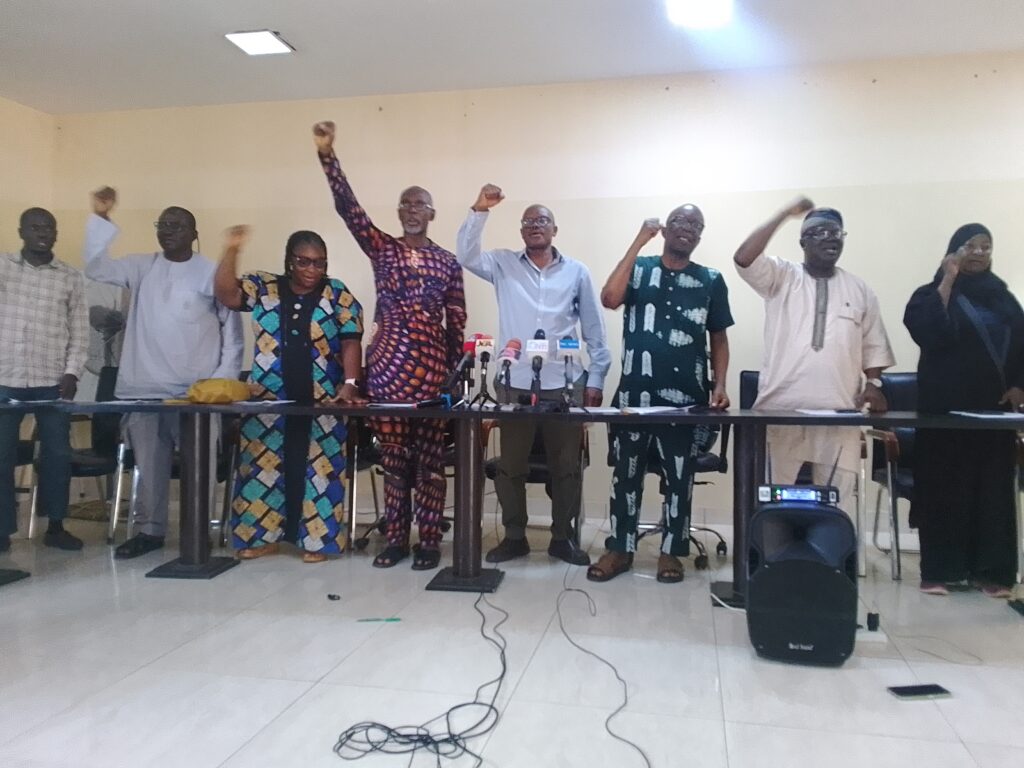
By Gami Tadanyigbe
The Academic Staff Union of Universities (ASUU), has called on the Federal Government to address all outstanding issues in previous engagements for the development of the Education system in the country.
The ASUU President, Mr. Chris Piwuna, made the call on Friday, in a press conference at the Festus Iyayi National Secretariat Complex, University of Abuja, to express displeasure with enormous challenges from hostile work environment and debilitating conditions of service among members.
According to him, the unaddressed Status of the 2009 FGN/ASUU Agreement, the struggle in State Universities and Erosion of University Autonomy is not in the interest of Nigerian University Education System.
“The governments of Nigeria, at the Federal and State levels, merely pay lip-service to the business of education in general and the welfare of university academics in particular. It is saddening that the tortuous journey of renegotiating the 2009 FGN/ASUU Agreement has continued endlessly since 2017.
“This press conference is necessitated by the need to share our burdens both for the education of Nigerian youths and the development of our dear country with you and other patriotic Nigerians and friends of Nigeria.
“The university system has not been spared from the whirlwind of policy misadventures and orchestrated befuddlement of the polity.
“The last push, which got frozen again after some recommendations by both parties were made for government’s consideration and approval in December 2024, is yet to be concluded.
“Our members in the last two years or so have had to contend with enormous challenges arising from hostile work environment and debilitating conditions of service. We shall attempt to elaborate on this shortly,” he said.
However, the ASUU President, who described the current state of the Nation as “NIGERIA AT A CROSS ROAD” and “AN UNDERDEVELOPED COUNTRY” called for an urgent action through a strong education system.
He also called for the rebuilding of the Nation through education, adding that there was need for an education summit where the major stakeholders should sit to deliberate on the sort of education system required.
“A land of boundless promise and monumental opportunities is paradoxically confronted with staggering contradictions. More than six decades after independence, the nation continues to wrestle with political instability, governance crises, multi-dimensional insecurity, economic uncertainties and neoliberal imperialist assaults, social discontent and disequilibrium, debilitating and suffocating mass poverty, and most glaringly, a bastardized, debased, underfunded and deteriorating education sector.
“The question remains: how can a country so rich in human and natural resources remain trapped in a nest of underdevelopment? The answer lies partly in our collective failure to prioritize education, the bedrock of any sustainable progress and development.
“You cannot develop a knowledge-based economy without a strong education system. Similarly, a viable people-centered democracy is impossible without the involvement of educated and informed citizenry. Civilian rule in Nigeria, though sustained since 1999, has largely been transactional rather than transformational.
Elections are characterized by rigging and voter suppression while violence becomes an avenue for mass disempowerment and democratic deconsolidation. Leadership, rather than being service-oriented, has too frequently become a means of personal enrichment and primitive accumulation.
Institutional weaknesses, bureaucratic inefficiencies, and endemic grand corruption continue to undermine governance at all levels. Although there are flashes of reform-minded individuals and active civil society actors, the connection between government policies and the realities of the common Nigerian remain disturbingly problematic,” ASUU President said.